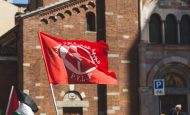NGO with ties to PFLP terror group lobbying Australian MPs ("No Way to Treat a Child")
On November 28, 2016, 49 Australian MPs signed a petition accusing Israel of committing “systematic” human rights violations. The public letter was the result of lobbying by the Australia Palestine Advocacy Network (APAN), in coordination with the US-based “No Way to Treat a Child” campaign, jointly led by Defense for Children International- Palestine (DCI-P) and American Friends Service Committee (AFSC).
As highlighted in NGO Monitor’s November 2016 report, several current and former DCI-P officials have ties to the Popular Front for the Liberation of Palestine (PFLP), recognized as a terrorist organization by the US, EU, and Canada. Additionally, both DCI-P and AFSC are leading advocates of BDS (boycotts, divestment, sanctions) tactics. Similarly, the project counts among its partners leading American BDS groups like Jewish Voice for Peace (JVP), American Muslims for Palestine (AMP), and the US Campaign for Palestinian Rights (formerly the US Campaign to End the Israeli Occupation). APAN is also a BDS supporter.
The petition misleadingly begins by quoting UNICEF criticism of Israel based on a 2013 document, not informing the reader that UNICEF has since updated its information. UNICEF’s 2015 report on detention of Palestinian prisoners, while noting room for improvement, determines that “The Government of Israel has since March 2013, taken a series of initiatives -particularly in terms of military legislation and the reinforcement of standard operating procedures that have addressed issues identified [in the previous report].”
The letter also provides a de-contextualized assessment of the challenges facing Palestinian youth. Any serious discussion of these issues must also address the Palestinian abuse of teenagers as child soldiers, encouraged to participate in violent riots, and incited to carry out attacks against Israeli civilians and security forces. Such analysis must grapple with the glorification of terror attacks in Palestinian media even in programming aimed at young children, Hamas-run youth indoctrination summer camps, and the naming of schools after terrorists who murdered Israeli civilians.
DCI-P
As highlighted in NGO Monitor’s November 2016 report on European-funded non-governmental organizations (NGOs) with ties to the PFLP, DCI-P’s current and former board members have strong ties to the terror group and its affiliate NGOs:
- DCI-P board member Mahmoud Jiddeh was arrested in Israel in 1968 for planting explosives for a PFLP attack that wounded nine Israeli civilians in Jerusalem.
- DCI-P board member Hassan Abed Aljawad has spoken on behalf of the PFLP at events in the West Bank, has been referred to as a PFLP leader and is a board member at the Union of Health Work Committees (UHWC), identified by USAID as a PFLP-affiliated organization in 1993 and whose Jerusalem center was closed by Israeli authorities in 2015 on suspicion of terror activity.
- Shawan Jabarin, served on DCI-P’s board from 2007-2014. In 2007, the Israeli Supreme Court referred to Jabarin as “Doctor Jekyll and Mister Hyde,” determining that he operates “some of the time as the CEO of a human rights organization, and at other times as an activist in a terror organization.”
- Former DCI-P board member, Nasser Ibrahim, was an editor of the PFLP’s weekly magazine, and co-authored a 2002 book, The Palestinian Intifada, Cry Freedom, which praises the Palestinian terrorist campaign of the early 2000s.
- Majed Nasser, Ibrahim’s co-author, is the deputy director of the UHWC.
- Additionally, the 2014 death of DCI-P employee Hashem Abu Maria was mourned by the PFLP, which referred to Abu Maria as a “commander.” The official PFLP announcement also referenced his work “for the defense of children” as a model for others to follow.
AFSC
- AFSC is a leading proponent of BDS tactics and advocates for a Palestinian “right of return.”
- The group encourages Israelis to dodge the mandatory draft.
APAN
APAN officials and employees are consistent in promoting a distorted and extreme view of the conflict, and many are ardent supporters of BDS:
- President of APAN, Bishop George Browning, wrote on June 26, 2016: “Supporters of BDS, like me, are labelled anti-Semitic by the Zionist lobby.” He added that “BDS is an expression of non-violent resistance. To condemn it is by implication to push the oppressed into resistance which will intensify the oppression. Perhaps that is what Israel wants – an excuse to intensify oppression.”
- In a May 10, 2016 article, APAN vice president Bassam Dally denied Israel’s right to exist, saying “The ongoing ‘ightiṣāb’: ‘rape’ of the land, heritage and culture has affected my own life, as a Palestinian citizen of Israel, well before I was made aware of those events or was able to comprehend the extent of the 1948 occupation of Palestine.” (emphasis added)
- In a December 15, 2016 interview, APAN executive officer Jessica Morrison downplayed the violent nature of stone throwing, saying that “It’s not uncommon for Palestinians to throw stones at Israeli military infrastructure, such as checkpoints, tanks and guard towers. For many, it’s an act of defiance towards the military that control their lives.”
- In an October 5, 2015 interview to Iran’s Fars News Agency, APAN executive member Peter Slezak said, “It works because there has been a very deep reservoir of good-will and sympathy for Jews since the horrors of the Holocaust and the racist anti-Semitism that led to it. So, people are understandably reluctant to be seen to criticize Jews. This sentiment is cynically manipulated and exploited by leaders of Israel and Diaspora Jewish communities who resort to the anti-Semitic slander against any critic of Israel.”
- Slezak has also hailed BDS as an “important and growing force.”
- APAN employee Michael Shaik worked for the International Solidarity Movement (ISM), an organization sympathetic to Palestinian violence. Shaik was deported from Israel for unknown “security charges” in 2003.

